What Republican Wave?
So far at least, there is no evidence that 2014 will be a "wave election."
With the mid-term elections approaching, Republican politicians and conservative pundits remain hopeful about the party’s chances, and looking at the numbers its easy to see why. The Presidents job approval numbers, both overall and on specific issues such as the economy and foreign policy, remain quite low and seem unlikely to change significantly over the 69 days between now and election day. In the Senate, where nearly all of the attention is focused this year, the GOP seems to be well positioned to take control of the Senate given the fact that the majority of competitive races are in states that Mitt Romney won in 2012 and John McCain won in 2008. Add in the fact that Republicans tend to have more favorable turnout in midterm years, and everything seems to be in place for a good GOP year. Notwithstanding all of this, though, as Larry Sabato notes at Politico, there are no signs at all that 2014 will be any kind of Republican wave, and it remains well within the realm of possibility that Republicans could once again fall flat in their bid to take over the Senate:
This is President Obama’s sixth-year-itch election. The map of states with contested Senate seats could hardly be better from the Republicans’ vantage point. And the breaks this year—strong candidates, avoidance of damaging gaffes, issues such as Obamacare and immigration that stir the party base—have mainly gone the GOP’s way, very unlike 2012.
Nonetheless, the midterms are far from over. In every single one of the Crystal Ball‘s toss-up states, (Alaska, Arkansas, Iowa, Louisiana and North Carolina), the Republican Senate candidate has not yet opened up a real polling lead in any of them. Democratic nominees have been running hard and staying slightly ahead, or close to, their Republican foes. (See Politico’s interactive Senate ratings.)
Earlier this year, we published a “wave chart” giving the range of Senate election outcomes, from ripple to tsunami. Sometimes tidal waves, such as the 2006 Democratic swell that gave the party control of both houses of Congress, develop in late September or October. That’s certainly still a possibility for the GOP in 2014. However, the summer is waning, and as Labor Day approaches our estimate remains a Republican gain of four to eight seats, with the probability greatest for six or seven seats—just enough to put Republicans in charge of Congress’ upper chamber. The lowest GOP advance would fall two seats short of outright control; the largest would produce a 53-47 Republican Senate.
A year ago, it was not hard to find Republican leaders who privately believed the party could score a dramatic breakthrough in the Senate, with the GOP emerging with perhaps 55 or 56 seats. This objective was vital not just for the jousting during President Obama’s final two years in the White House. At least as important is the fact that the GOP sees a much less friendly Senate map in 2016, when it will have to defend 24 of 34 seats, including incumbents elected in 2010 in Democratic states such as Illinois, Pennsylvania and Wisconsin. In addition, presidential year turnouts usually draw far more minority and young voters to the polls, most of whom reliably vote Democratic from top to bottom of the ballot. A thin GOP Senate majority created this November could turn out to be very short-lived.As we’ve said manytimes, 2014 should be a Republican year, with GOP gains in both houses of Congress. Yet Republicans have a terrible record of beating incumbent Democratic senators, going back to their last good year in this category, 1980. There is no obvious way for the GOP to gain the six seats necessary for control without taking down some incumbent Democrats, a task at which Republicans have struggled—they haven’t beaten more than two Democratic Senate incumbents since that huge 1980 landslide.
Sabato goes on to analyze each of the battleground races this year and, as he notes there is no sign yet that the GOP is headed for a massive win like what they saw in 2010 or what Democrats saw in 2006. Off the top, there are three states — West Virginia, Montana, and South Dakota, that seem as though they are definite Republican pickups. Beyond that, though, the math gets much more complicated. In North Carolina, Senator Kay Hagen maintains a narrow lead over State House Speaker Thom Tillis thanks to the presence of a Libertarian Party candidate that is garnering roughly 6% in the polls. Since North Carolina does not have a runoff, Hagan only needs to garner a plurality of the vote. In Arkansas, Mark Pryor remains within the margin of error against Congressman Tom Cotton and the still-large number of undecided voters in the polls suggests the race could go either way. In Louisiana, the head-to-head matchup between Mary Landrieu and Bill Cassidy, which would be held in December assuming Landrieu fails to get above 50% of the vote in November as expected, is similarly a dead heat. And, in Alaska Senator Mark Begich still leads newly minted Republican nominee Dan Sullivan, although the first poll taken after Sullivan won the nomination does show him slightly ahead. In the meantime, Republicans also have to worry about defending open seats in Georgia and Kentucky where there is at least a slight possibility of a Democratic pickup in one or both races. Finally there are three races that could be surprises. Iowa where Joni Ernst and Bruce Braley are basically tied in the race to replace Tom Harkin, and Michigan where Congressman Gary Peters has a thing lead outside the margin of error over former Secretary of State Terry Lynn Land, and Colorado where Senator Mark Udall is locked in a tight race with Congressman Cory Gardner. Seemingly out of the picture, at least for now, are states that some Republicans had hoped the party would be competitive such as Virginia, New Hampshire, and Oregon.
Looking at these numbers, it’s easy to see how the GOP could pick up a small majority in the Senate in November. In addition to the three states that seem to be locks, the party would need to pick up just three more states to get to the 51-49 seat margin that they need. That could come either from the four races against Democratic incumbents in Romney states, or from a combination of wins there and a win or two in any of the three close races. Of course, it would also require that the GOP hold on to both Georgia and Kentucky since a loss in either or both of those races would mean having to pick up a Democratic seat elsewhere to make up for that loss. At the same time, it’s also easy to see how the Democrats could end up holding on to the Senate. Kay Hagan could continue to benefit from a third-party candidate in North Carolina, Mary Landrieu could once again pull victory from the jaws of seeming defeat, Mark Begich could become the first two-term Democratic Senator from Alaska in 30 years, and either Alison Lundergan Grimes or Michelle Nunn could end up winning their races. Democrats would still end up losing seats this year,and their majority may exist in 2015 thanks only to Joe Biden’s tie-breaker vote, but it would still be a majority and that would make things much easier for the President when it comes to things like Judicial and Executive appointments during his final two years in office.
What doesn’t seem likely at all at this point, though, is a massive Republican wave in the Senate that gives them the kind of majority they had after 1980 or 1994, or that Democrats had after 2006 and 2008. Theoretically, the GOP won every race I’ve listed above they’d end up with a 55-46 majority. Throw in a couple of the races that no longer seem competitive and it could go even higher. It just doesn’t seem as though that’s likely to happen, though, for the reasons that Sabato cites. If there was going to be a wave, one would think we’d see some signs of it by now. Instead, except for the races that Democrats have essentially given up on like South Dakota, Montana, and West Virginia, we see races that are within the margin or error or close to it. Unless that changes significantly in the weeks after Labor Day, it’s likely that the issue of who controls the Senate after November will be a nail biter and, thanks to the potential for runoff elections in Louisiana in December and Georgia in January, we may not even know who controls the Senate for many weeks after Election Day.
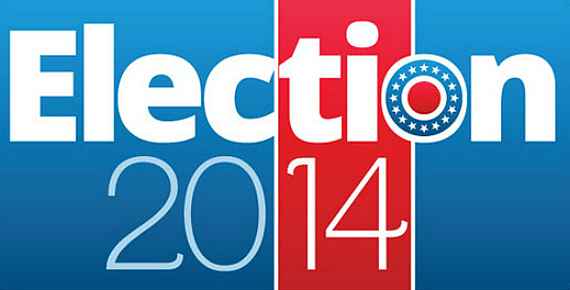

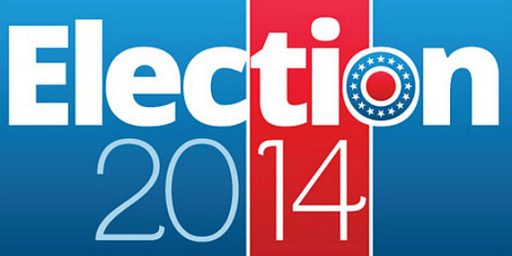
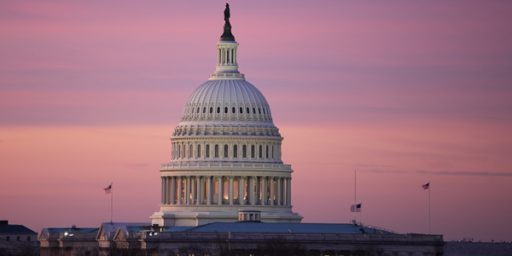
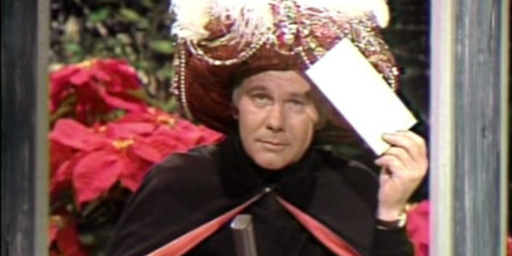
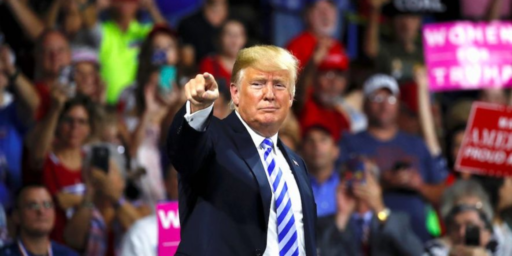
Yeah, this is a map election, not a wave – at least not so far. But polling in Senatorial races is usually pretty weak, so who knows. It could all come down to turnout efforts, and the Dems in 2014 were a generation ahead of Republicans. We’ll have to see if the GOP has found a few smart techies to help them out.
The best part of the article is the comment section:
“The polls are skewed and every naysayer is just a Democrat shill!”
Some people never learn.
It should be remembered that one of the things that “sealed” the deal for Democrats in 2006 was the Mark Foley scandal which broke in late September, capping off a number of Congressional scandals from the last two years.
The Foley thing was important in that it appeared to further demoralize the Republican base — in particular, I suspect the voters who would eventually peel off and resurface as the Tea Party in 2010.
Without a similar scandal to demoralize the Dems, I have a hard time seeing a sudden wave forming during this September/October.
I wouldn’t be surprised if some “law and order” Republicans get swept into office because of a White backlash against the lawless rioting in Ferguson, Missouri. – The race and antiwar riots in the 1960’s only served to sweep some like Nixon and Agnew into power at the time. – Around election time, expect some politically sharp Republicans to seize on “law and order” themes as a counter to what went on in Ferguson, and for it to elect some Republicans to office.
The Democrats also appear weak on foreign policy right now, where some Republicans who talk tough, but would probably do about the the same as the Obama White House to exploit this weakness issue. Remember how Iran really spoiled Jimmy Carter on election day 1980.
I dunno about all that Paul. Law and Order at home and overseas are perennial GOP issues even though there’s probably no there there.
I do remember Iran releasing the hostages on the eve of Reagan taking office, and the many sources thereafter that credited Bill Casey with persuading the Iranians to keep them until at least the 1980 presidential balloting.
@PAUL HOOSON:
I think that’s possible in some states. On the flip side we have some weed initiatives that might bring out lefties, and the same thing that pushes right-wing buttons may alsomotivate African-American turnout.
As for FP, yeah, I think that’s about right. Voters don’t pay a lot of attention to FP, it’s mostly just a sense of whether things are going well or poorly, with the assumption that POTUS is responsible, either way. I don’t know that I really blame voters – there are lots of issues I either ignore or push down the priority list. I’m frustrated by the level of ignorance, but that’s because FP is something that interests me. I can see why rational people might throw up their hands in despair trying to parse the Syria-Iraq-ISIS-Al Qaeda craziness.
@PAUL HOOSON:
Actually, on that point I disagree.
Some Republicans are seriously talking a non-interventionist approach (Rand Paul and others). Some Republicans – like McCain and many others – are excoriating Obama for non-intervention in Syria when a few months ago those same people declined to give Obama authorization to do anything. People have to get used to the idea that America cannot control turbulent events everywhere in the world.
@PAUL HOOSON:
Dunno. The Ferguson riots were pretty small-scale and didn’t last long, in fact they’ll probably be remembered mostly for the police overreaction.
@PAUL HOOSON: Have to disagree Paul. “Law and Order” may work in some congressional districts, but in state wide races a different demographic comes into play. Not to mention that all the Law people saw were wearing battle armor, carrying M-16s, and riding armored vehicles to do battle with…. People standing in the street with their hands up saying “Don’t shoot.” Those are some pretty graphic images and I don’t think they will play well.
As to FP, the biggest diff between Obama and Republicans remains with the Republicans who want Obama to do the last thing voters want. I don’t see that playing well either.
@PAUL HOOSON:
No, reading Nixonland again last month brought that thought to mind for me as well, however the demographics in the nation have shifted dramatically since then– hell even a repeat of say the 1980 or 1984 Republican coalition would lose in landslides of varying sizes today.
@Peter: I’m with you, I don’t see a big white backlash coming from Ferguson. I’ve been struck by how different news coverage has been on Ferguson. The Conservative Echo Chamber has been big on scary black people, but the MSM has been more even handed. There has been recognition that Ferguson’s black population has legitimate grievances and that the Ferguson cops have been part of the problem. Not wonderful coverage, but I’ve been pleasantly surprised. I see headlines that opinion on Ferguson is divided by race, but apparently a deeper look shows opinion is really divided by party. Republicans are pro cop and anti protesters so strongly that it makes it look like white people are. But apparently a closer look shows Dems and Indies much less so.
@PAUL HOOSON:
The rioting in Ferguson didn’t happen in a vacuum. The reason for the “rioting” was the shooting death of an unarmed black man – yet another – at the hands of the police.
Don’t be surprised if this situation makes more “Social Justice” Dems swept into office as more people who usually don’t get involved in mid-term elections suddenly get involved.
The mood of the country is still pretty much the same, with the exception of Obamas approval numbers, which are still dropping. But without real conservatives in place in the GOP “Leadership” they’ll not be able to capitalize on it.
That said, Reynolds (SHOCKINGLY ENOUGH)…may actually be onto something on the GOTV efforts…. I did notice earlier today (and can’t find it now.. I’ll keep looking) a poll suggesting the rank and file GOP thinks they’ll do better this time. (Shrug) I’ll look around again, when I get in a better spot.
@PAUL HOOSON: The big difference is the riots in the 1960’s were in several major cities across the country. The Ferguson “riots” is chump-change and forgettable. The only thing people will remember from this is the overreaction of the police and even that is a big stretch.
@PAUL HOOSON:
Iran was just one of the problems that Carter faced, inflation and the economy was a much bigger problem for him.
I think we have to wait for some post Labor Day polling. I think this will be more of a status quo election. The Democrats can’t really claim credit for the weak recovery, and the Republicans can’t make a credible argument that they would do better on the economy than the Democrats. The big argument that the Republicans were going to use in the 2014 elections-OBAMACARE!- has disappeared as an issue, because, quiet as its kept, Obamacare is actually working.
[ One example of the fading of Obamacare as an issue is that Doug has virtually stopped posting on Obamacare:-)]
I think that we will see more good Obamacare and economic news coming up, which means that Democratic prospects for 2014 elections will improve, but not by much. This means incremental gains by Republicans in November, in a year where they should be doing better than incremental.
I just don’t see the Republicans taking the Senate. Is it possible? Sure. But I just don’t see it.
I for one would sleep better at night if the GOP took Bithead’s advice.
@stonetools:
Yep. They’ll add seats in the Senate and may even take control. Then it’ll be 2016 and the GOP will lose all of its power. They won’t take the White House, they’ll lose the Senate if they ever managed to take it, and may even lose the House.
@PAUL HOOSON: “I wouldn’t be surprised if some “law and order” Republicans get swept into office because of a White backlash against the lawless rioting in Ferguson, Missouri. ”
I.e., in favor of lawless gangs described as ‘police’.
Doug, you know what word is not in that article?
‘Silver’
As in ‘Nate Silver’.
When Politico makes predictions, I don’t take them seriously – although it is good to hear a rag like them demoralized.
@rudderpedals: “I do remember Iran releasing the hostages on the eve of Reagan taking office, and the many sources thereafter that credited Bill Casey with persuading the Iranians to keep them until at least the 1980 presidential balloting.”
Considering that it’s now been proven that Nixon conspired to prevent a peace agreement, I’d put the odds on that as waaaaaaaaaaaaaaaay in favor.
@socraticsilence: “No, reading Nixonland again last month brought that thought to mind for me as well, however the demographics in the nation have shifted dramatically since then– hell even a repeat of say the 1980 or 1984 Republican coalition would lose in landslides of varying sizes today.”
Somebody pointed out that if the demographics of 1980 had held in the USA, McCain would have one, once the white/non-Hispanic votes were counted. He would not have needed a single non-white or Hispanic vote.
But those demographics have changed.
@Barry:
As my tech writer says,